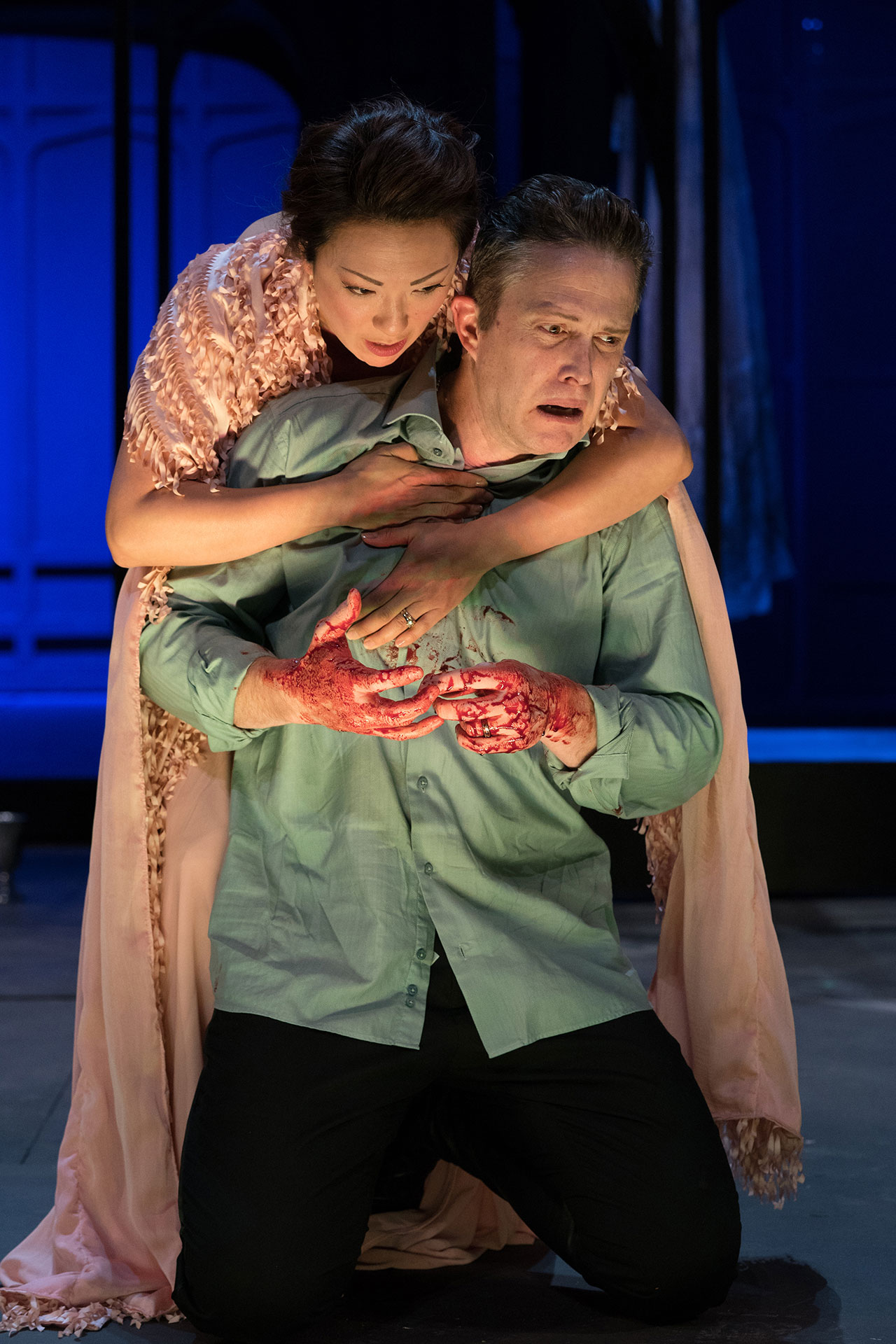 |
| Oregon Shakespeare Festival photo by Jenny Graham |
The Play
Yeah, not going to summarize this for you. It's Macbeth. From the program and the preface we attended beforehand, we got the impression that they were going to emphasize witches and the "love story" of Lord and Lady Macbeth.We did learn a few tidbits in the preface that were worthwhile. The play is based on some historical figures--there really was a King Duncan, and a Macbeth, and several other characters who seem to be at least loosely based on historical people. The story (as one would expect from Shakespeare) is kind of a mashup of various incidents of regicide and succession fights in actual Scottish history. Also, the timing of the appearance of the play suggests it was written to curry favor with King James early in his reign (he being a Scottish king with an intense interest in witches and witchcraft).
The Production
I was keen to see this show, in part because of good casting. Lord and Lady Macbeth (Danforth Comins and Amy Kim Waschke, respectively) are favorites of ours in the company, and Bay Area product William Hodgson is Malcolm, a quite important role. Plus, you know, Macbeth.On the whole it's a pretty solid production, quite visually striking (Macbeth is always best staged outdoors, as it is here in the Elizabethan theater) and well-acted. The opening scene is added: a brief funeral for the Macbeths' dead child (who is mentioned a few times in the script, but rarely emphasized). It's a powerful, wordless scene, and a great showcase for Comins's expressive face and body--he is the very picture of abject desolation at the loss of his child.
Unfortunately, that sense of loss and longing doesn't carry through the rest of the production. It's as if they forgot they wanted to emphasize that thread, because it never really reappears as a motivational point. Conversely, the trio of witches (Robin Goodrin Nordli, Miriam A. Laube, and Erica Sullivan) are omnipresent. They are literally almost always on stage, seeming to indicate that Macbeth is constantly being driven (or at least influenced) by their malign presence, though they mostly seem like a distraction. To say nothing of the appearance of Hecate (Michele Mais), a part usually cut entirely from the play (and with good reason, as it really does nothing to advance the plot). That inclusion is quite inexplicable.
And though the Macbeths clearly demonstrate the passion of their relationship, there doesn't seem to be much depth or nuance to it. The actual chemistry or connection doesn't come through, and it's unclear what director Jose Luis Valenzuela wants us to make of it. This isn't the controlling, driving Lady Macbeth we sometimes see, nor does it appear that Macbeth is motivated by a particular ambition or desire to advance his family. For all his brooding and emoting, this Macbeth is something of a cipher.
But boy, can he emote. Comins turns up the crazy pretty quickly, suggesting that this Macbeth is pretty much on the thin edge of sanity all along. Unfortunately, he turns the knob up to 11 rather early, leaving not much room to maneuver later in the show. The key scene late in the play after Lady Macbeth kills herself (which is extremely impressively depicted, by the way--bravo!) is intense, but it's hard to see Macbeth as being crushed or broken by his wife's death because he is already so unhinged.
I will say that Hodgson's Malcolm is quite effective in his late scenes. He has a steadiness and self-composition that contrasts nicely with the late, deranged king.
The other element that I found a bit baffling was the Macduffs. Chris Butler as Macduff is a fine fighting man, but despite his words, it's really never shown that he's a family man--there are no intimate connections between him and his wife (Mais again) and children. Similarly, the scene where Lady Macduff and her children are slaughtered is normally one of the most wrenching, emotional points in the play, but her seeming stoic detachment takes all the air out of the scene. Similarly, upon learning of his family's demise, Macduff says he's bereft, but he only shows it as angry, and he stays there the rest of the play.
Bottom Line
It's a pretty good Macbeth on the whole, a high-quality production and all that you'd expect from OSF and one of their signature Shakespeare shows. But the emotional content is just off. We never get to see the derangement growing, or the ambition being stoked from a tiny ember to an all-encompassing obsession. A play with this intensity demands some subtlety to make the emotional highs and lows work, but for some reason this director seems to feel everyone just needs to be either repressed or completely raving, with no path through a middle ground.So it's a bit disappointing, if generally well done. Definitely not the best Macbeth I've seen.
No comments:
Post a Comment